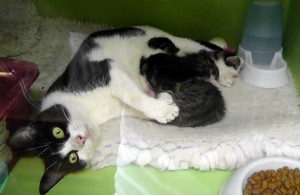
Pregnant or nursing females often stay with a fosterer for 3-4 months till the kittens are old enough to be rehomed
The charity is appealing for more volunteer foster carers in the Pocklington-York & West Hull villages areas. Help is needed to alleviate some of the strain of the numerous cats and kittens it receives calls for. Fosterers are people who look after cats or kittens in their home on a short-term basis until they are ready to go to our homing centre for rehoming.
Rose Atkin charity coordinator said: “Fosterers are vital to our rescue work, as their role is caring for cats & kittens whilst they are ‘between homes’.
“The main requirements of a fosterer are patience and understanding towards animals of varying temperaments, as they will come from a range of different circumstances and backgrounds. On the practical side, it is essential to have a car, or access to a car, for picking up food/litter and for transport to and from our vets (York area – Battle Flatts vets/Hull area – Swanbridge vet group). Foster periods can range from six weeks to over six months, so volunteers need to be prepared to make this type of time commitment.”
People become fosterers for many different reasons. The obvious benefit is the companionship and affection they receive in return from their foster cat/s, as well as the great personal reward of knowing they are making a real difference to that animal’s life. Fostering may also be an option for anyone who has concerns over the rising costs of owning a pet, as the charity covers the direct costs of fostering including veterinary care, litter, and cat food.
Rose continued: “Fostering involves taking the cat into your home on a temporary basis, and providing all the daily care requirements to ensure the cat is healthy and happy. Fosterers usually have a spare room in the house where the animal can be kept warm, secure and separate from other pets they may have. For cats with nursing kittens, orphan kittens, or timid cats, we typically provide a portable pen to safely contain them.
“The biggest benefit of fostering is that you are helping an animal that may have never had home towards a better future. Sometimes this can be the first time in its life that the animal has felt safe and had a reason to trust humans. Even if you can only look after a cat once or twice a year, such as when another fosterer is on holiday, this will be helpful.
“Fosterers must be over 18, with no upper age limit except for being physically able enough to maintain a clean litter tray, bending, carrying, going to vets etc. So if an older person has put off getting a cat because they are concerned that it may outlive them, then fostering could be an option for them.”

Orphan kittens that need extra care or socialisation benefit from foster care
One of our regular volunteers who lives near York has been fostering for the charity for over five years, added: “The feeling of achievement when a nervous ex-stray finally comes up to you for a fuss, after maybe weeks of shying away from human contact, is just wonderful. If you ever felt you wanted to make a real difference to an animal’s life, then please consider fostering.”
Be warned though, many fosterers fall in love with their first foster cat, and end up keeping him or her. Longterm fostering opportunities are also available for elderly cats & cats with manageable health conditions. Anyone interested should call Rose Atkin on 07967 627492 (after 6pm – NO TEXTS pls).